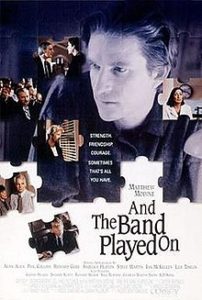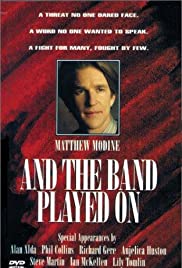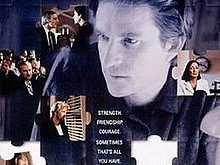And the Band Played On ***** (1993, Matthew Modine, Alan Alda, Ian McKellen, Richard Gere, Lily Tomlin, Patrick Bauchau) – Classic Movie Review 10,302
The urgent and timely 1993 American TV docudrama film And the Band Played On is directed by Roger Spottiswoode, who turns Randy Shilts’s controversial book about how and why the AIDS crisis happened into a powerful and provocative film that wears its heart and its conscience on its sleeve. It won the Emmy for Outstanding Made for Television Movie.
The teleplay by Arnold Schulman is based on the best-selling 1987 non-fiction book And the Band Played On: Politics, People, and the AIDS Epidemic by Randy Shilts. The $8 million, 141 minutes HBO Pictures movie was premiered at the Montreal World Film Festival before being broadcast by HBO on 11 September 1993 and later aired on NBC in 1994 with a parental discretion warning because of its ‘sensitive subject matter’.
The story spans the decade from the discovery of the first case of death through a suppression of the of immune system in the mid-Seventies to the isolation of the virus in the mid-Eighties, and is based around a small, devoted band of researchers who fought against public indifference, political hostility and especially prejudice against homosexuals.
The prejudiced Reagan government is named squarely as the reason little money was spent to stop the spread of the disease or test contaminated blood supplies, and the film is in no doubt that with proper funding and research, the epidemic could have been contained and scale of the tragedy prevented. But, also, infighting in the scientific community hampers the early fight against the AIDS epidemic, as the rivalry between American virologist Dr Robert Gallo and Dr Luc Montagnier, his French counterpart at the Pasteur Institute, leads to a dispute over who first identifies the AIDS virus. Meanwhile the gay community in San Francisco is divided over the disease and what is to be done about it.
This angry, committed film takes Spottiswood back to the urgency that informed his Under Fire, and, with the help of a cogent script by Arnold Schulman (A Chorus Line), he keeps a long, episodic narrative driving along, varying the mood and pace effectively and throwing in plenty of human drama and comic moments to sustain interest and sympathy at a high level.
Matthew Modine is just right as the young James Stewart-style everyman character, epidemiologist Dr Don Francis, fighting for what’s right and decent. HIV/AIDS researcher Dr Don Francis is one of the first scientists to suggest that AIDS was caused by an infectious agent.
Ian McKellen is ideally cast as congressional aide Bill Kraus, a gay rights and AIDS activist who annoys his young lover San Francisco artist Kico Govantes (B D Wong) by spending all his time campaigning and eventually gets sick himself. Bill Kraus (June 26, 1947 – January 25, 1986) served as liaison between the San Francisco gay community and its two successive US Representatives in the early Eighties.
Meanwhile Alan Alda (cleverly cast against type) brings the needed drama as the blithe villain of the piece, Dr Robert Gallo, the American doctor who cynically tries to take the research credit away from France’s Pasteur Institute. Gallo is a biomedical researcher and one of the discoverers of HIV as the infectious agent responsible for AIDS. Patrick Bauchau plays French virologist Dr Luc Montagnier, one of the discoverers of HIV.
There is also a host of cameos from the famous, most of which are assets, especially Richard Gere as a Broadway choreographer who contracts AIDS and Lily Tomlin as researcher, physician and epidemiologist Dr Selma Dritz. The obituary of the unnamed choreographer played by Gere is Michael Bennett’s real-life obit.
The film remains surprisingly up and hopeful, concentrating on the essential goodness of most doctors and gay people.
It was nominated for 14 Emmys, and won three: Outstanding Made for Television Movie, Outstanding Casting for a Miniseries or Special and Outstanding Editing for a Miniseries or Special — Single-Camera Production. It was nominated for two Golden Globe Awards: Best Miniseries or Television Film and Best Actor – Miniseries or Television Film (Matthew Modine).
Tragically, American journalist and author Randy Shilts died of AIDS on 17 February 1994, aged 42.
The film ends with moving footage of a candlelight vigil and march in San Francisco, followed by a heartbreaking montage of images of celebrities who have died of AIDS or were involved with HIV/AIDS education and research, accompanied by Elton John singing his ‘The Last Song’. The montage includes Bobbi Campbell, Ryan White, Rock Hudson, Anthony Perkins, Tina Chow, Rudolf Nureyev, Arthur Ashe, Michael Bennett, Liberace, Freddie Mercury, Elizabeth Glaser, Magic Johnson, Larry Kramer, Alison Gertz, Max Robinson, Halston, Willi Smith, Perry Ellis, Peter Allen, Steve Rubell, Keith Haring, Stewart McKinney, Denholm Elliott, Brad Davis, Amanda Blake, Robert Reed, Michel Foucault, and Tom Waddell.
Also in the cast are Glenne Headly as Dr. Mary Guinan, Richard Masur as Dr. William Darrow, Saul Rubinek as Dr. James Curran, Jeffrey Nordling as Canadian flight attendant Gaëtan Dugas, Donal Logue as AIDS activist Bobbi Campbell, Nathalie Baye as Dr. Françoise Barre, Phil Collins as San Francisco bathhouse owner Eddie Papasano, Steve Martin as the brother of an AIDS patient, David Marshall Grant as Dennis Seeley, Ronald Guttman as French virologist Dr. Jean-Claude Chermann, Anjelica Huston as Dr. Betsy Reisz, Ken Jenkins as Dr. Dennis Donohue, an HIV researcher, Richard Jenkins as dermatologist Dr. Marcus Conant, Tchéky Karyo as French physician Dr. Willy Rozenbaum, Dakin Matthews as Congressman Phillip Burton, Peter McRobbie as Dr. Max Essex, Charles Martin Smith as Dr. Harold Jaffe, Christian Clemenson as Dr. Dale Lawrence, Rosemary Murphy as Blood Bank Executive, Stephen Spinella as Brandy Alexander, David Clennon as Mr. Johnstone, Swoosie Kurtz as AIDS patient Mrs. Johnstone, Lawrence Monoson as Chip and David Dukes as Dr. Mervyn Silverman, San Francisco Director of Health.
© Derek Winnert 2020 Classic Movie Review 10,302
Check out more reviews on http://derekwinnert.com




